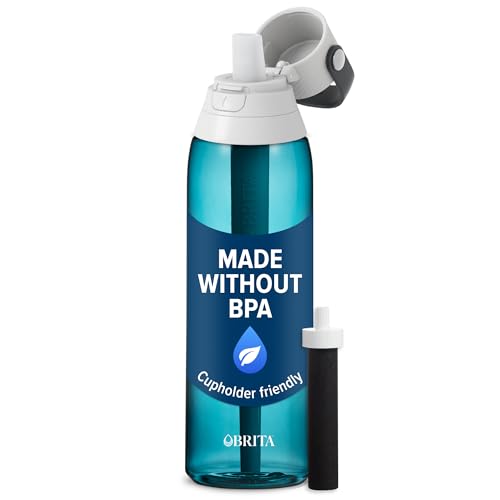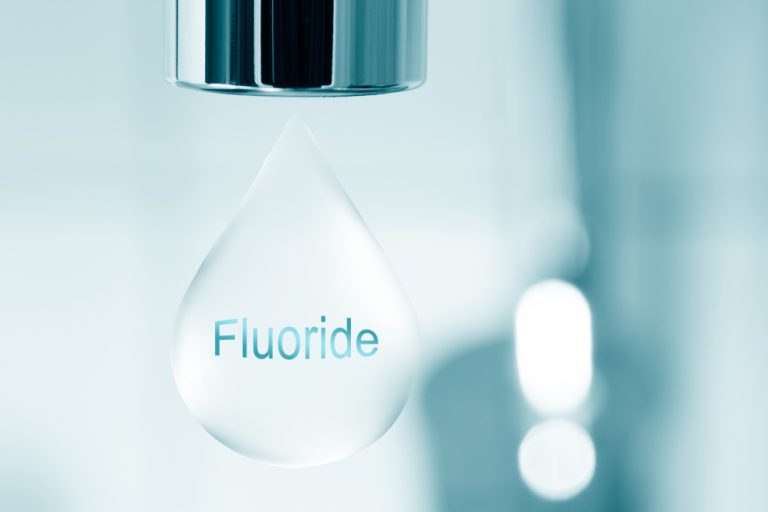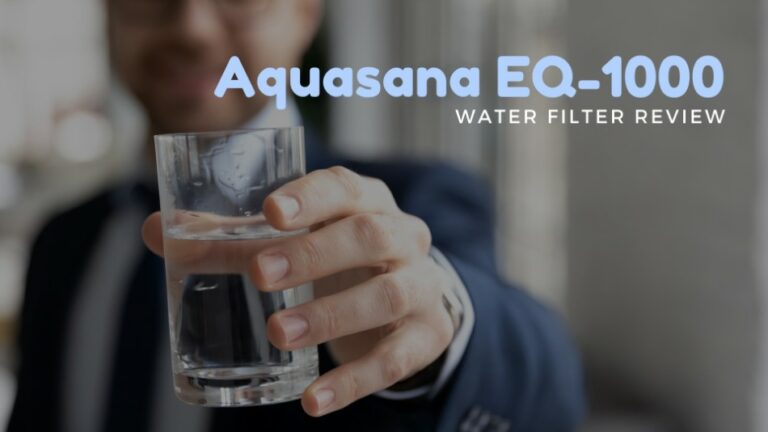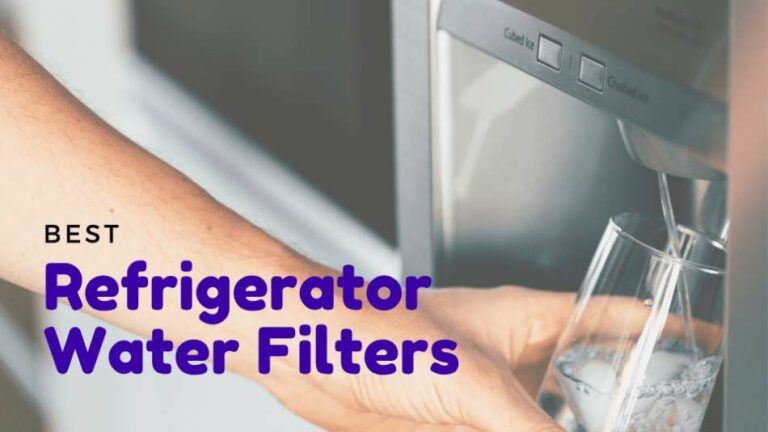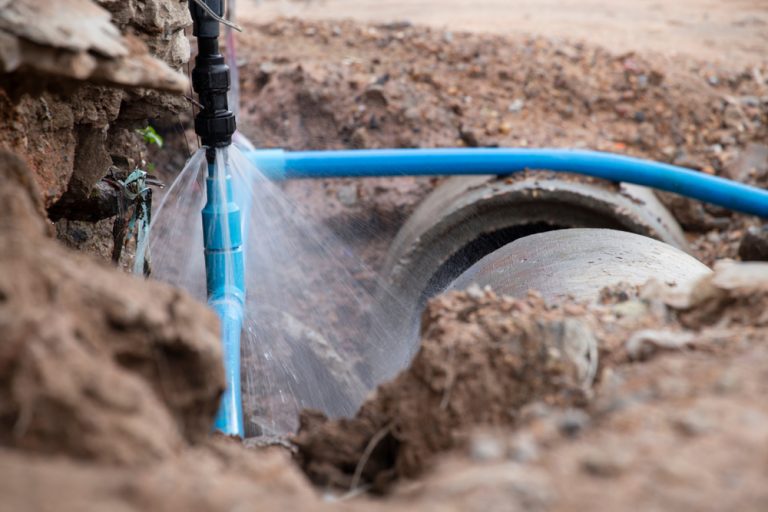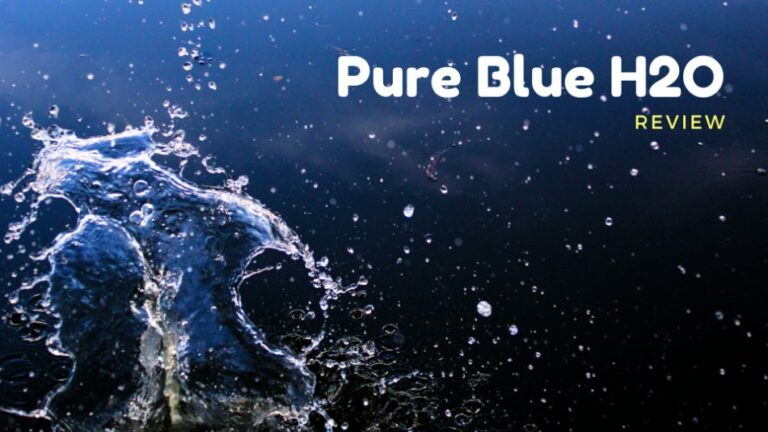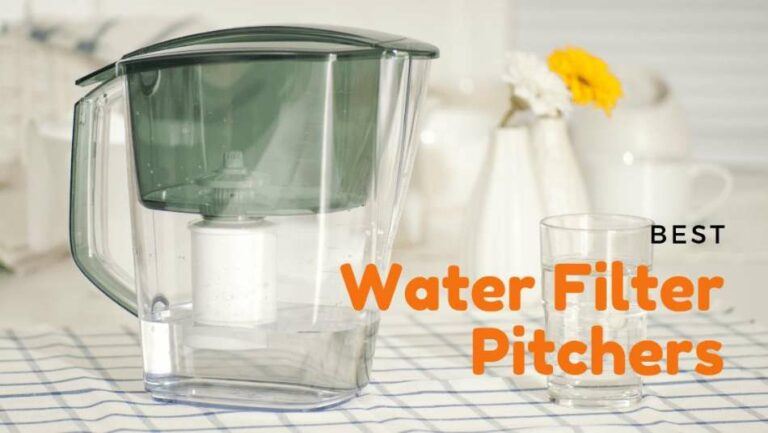Best Water Filters: Complete Guide for 2021
While you can’t do much to change the nature of the well or municipal water you’re using, you can use a potent filtration system to protect yourself and your family from contaminants and impurities.
Water filters are designed to improve the quality and taste of water so you can use it safely for drinking, cooking, and other household purposes. Luckily, there are several options, so you can pick the right one for you.
To make your job easier, we’ve gathered information about the best water filters of 2021. We’ve analyzed their specifications so you can pick the one that works for your household needs.
Best Water Filters of 2021
There are many great water filters out there, but there are none that can do it all. For example, a whole-house filter is incredibly useful, but it won’t help if you’re on the go. In that case, a filtered water bottle would work best.
With that in mind, we’ll be reviewing several different types of water filters and listing our top picks for each type. Here are the types of water filters we’ll review in this article:
As an Amazon Associate we earn from qualifying purchases.
- Water filter pitchers (here’s our favorite)
- Whole-house filters (here’s our favorite)
- Under-sink filters (here’s our favorite)
- Faucet-mounted filters (here’s our favorite)
- Reverse osmosis filters (here’s our favorite)
- Water bottles with filters (here’s our favorite)
Note that we’ve reviewed other types of water filters out there, such as filters for your shower, and even filters for your bathtub.
Best Water Filter Pitchers
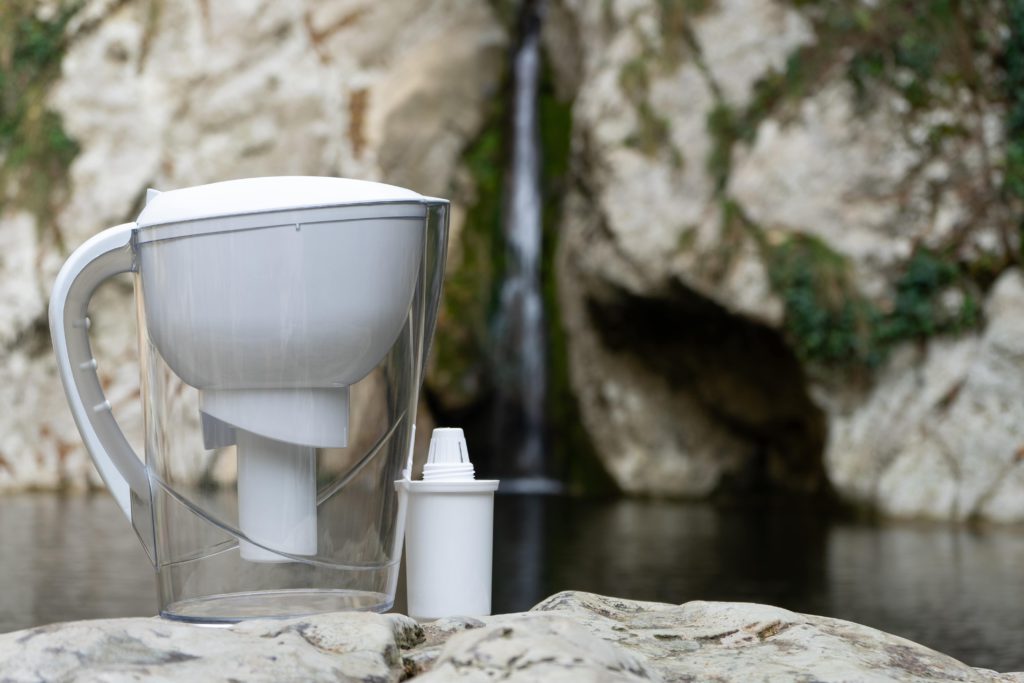
Water filter pitchers are designed to hold and purify a certain amount of water. Once you fill the container, the water passes through a system made up of one or more filters to provide you with clean and tasty water.
After the pure water is drained into the container, you can pour it into a cup where the design of the pitcher guarantees that it won’t get in contact with the filters or contaminants.
How Do Water Pitcher Filters Work?
The pitcher is filled with tap water that passes through a filter to collect in the container after it has been purified. Most pitchers have one or more filters.
Activated Carbon Filters
Most pitchers have an activated carbon filter that blocks impurities because their atoms stick to its surface. Activated carbon is usually made of coconut shells, coal or wood. After a while, the porous surface of the filter gets filled with impurities, reducing the purification rate and the ability of the filter to block impurities. This means that it’s time to change it.
Activated carbon can remove some contaminants from your drinking water, but not all of them. Here is what it can get rid of.
- Chlorine is a disinfectant that is usually found in municipal water. It changes the taste of water and can be related to several health issues.
- Chlorine also produces trihalomethane compounds when it gets in contact with the organic matter in water. Although the government limits the addition of chlorine, you want to make sure that the water you’re using for drinking and cooking is chlorine-free.
- Volatile organic chemicals or VOCs are found in herbicides and pesticides but they will find their way to drinking water.
- Some parasites are safely removed when the water passes through activated carbon. If your water is infected with Cryptosporidium or Giardia, you can make sure that it’s safe and clean if you use a pitcher with an activated carbon filter.
Cartridge Filters
Some filter pitchers have cartridge filters. These pitchers will let water pass through several stages to improve the taste and quality. Such filters will restore some of the minerals to your water, as they might get filtered by the activated carbon.
Tourmaline filters produce a small electric current that moves water molecules in a specific frequency that resembles that of your body. Water that passes through tourmaline will increase your level of metabolism.
What Are the Pros and Cons of Water Pitcher Filters?
Water filter pitchers are common household items because they’re affordable and require zero installation. Here are some of their pros.
- Water filter pitchers are lightweight and suitable for small households. They’re more budget-friendly than bottled water, especially if you’re worried about leaving your water in plastic containers.
- They’re versatile. You can keep your pitcher in the fridge to drink cold water all day long.
- Pitchers are portable and can be easily packed for a trip, guaranteeing access to clean and healthy water when you’re away from home.
However, these filtration systems come with a list of cons. You should consider them when you’re shopping for the best water filter.
- The filtrations process is slow. This becomes a real problem when you’re living in a big household.
- You’re limited by the capacity of the container.
- Charcoal filters need to be changed regularly. This makes pitchers a bit expensive in the long run.
- Pitchers can’t be used with heavily contaminated municipal or well water. They can’t get rid of most microorganisms, organic, and chemical compounds.
Our Top Picks:
1. Clearly Filtered Water Filter Pitcher
Last update on 2026-02-16 at 06:56 / Affiliate links / Images from Amazon Product Advertising API
This filter is a bit pricey, but it filters more than 230 contaminants and impurities. In addition to removing chlorine and lead, this is one of the few pitchers that can effectively remove fluoride and microplastics.
Thanks to its selective filtration technology, it doesn’t remove magnesium or calcium which are essential for your health. It holds up to 10 cups of purified water.
It’s made of BPA-free food-grade materials and the filters are designed to last for up to four months, reducing the cost in the long run. It can be used with well water, but this will decrease the life of the filter.
The filtration process is rather slow and the top lid tends to fall when you’re pouring water. Moreover, the handle isn’t that sturdy, making your job more difficult especially when the pitcher is full.
Pros:
- Removes impurities efficiently
- Selective filtration that keeps healthy minerals
- Works with well water
- Filters last for long
Cons:
- Filtration process is slow
- Problems related to the quality of the lid and handle
2. Seychelle pH2O Alkaline Water Filter Pitcher
Last update on 2026-02-15 at 09:50 / Affiliate links / Images from Amazon Product Advertising API
This water filter pitcher removes heavy metals like lead, arsenic, and mercury, in addition to asbestos, chromium 6, chloroform, VOCs, and fluoride. At the same time, it increases the pH level of water up to 9.5. Alkaline water is easier to absorb, making your cells more hydrated and enabling your body to flush out toxins at a faster rate.
Water tastes better and can be used to make refreshing drinks since the alkaline pH neutralizes the acidic nature of coffee and lemon juice. This pitcher will hold 8 cups of pure water, so it’s not a suitable option for a large family.
It’s fridge-friendly and will filter up to 200 gallons of water before the filters need to be replaced. The container is made of plastic so it’s lightweight and portable, and it’s BPA-free. You’ll have to replace the filters frequently, especially if your water is heavily contaminated. It doesn’t work with well water.
Pros:
- Lightweight and portable
- BPA-free plastic container
- Removes most impurities
- Makes the water more alkaline
Cons:
- Doesn’t work with well water
- Filters don’t last a long time
Best Whole-House Filters
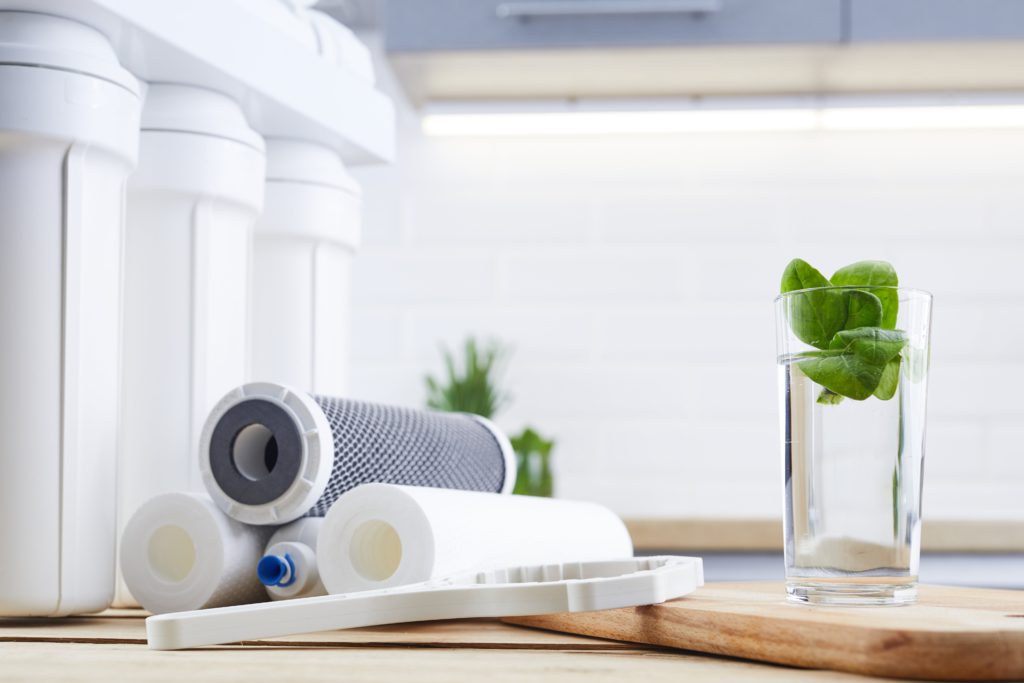
These filtration systems are attached to your water main line, guaranteeing that all the water that gets into your house is purified and cleaned. These systems work with well and municipal water supplies because they’re made of several filters.
How Do Whole-House Water Filters Work?
These systems feature various filters. The first filter is sediment pre-filter that blocks larger particles and lengthens the life of other filters. Water will be free of most dust, rust, and debris, but will have to go through other stages of filtration.
The next filter is usually made of activated carbon. Through absorption, the particles of impurities get stuck to the large surface area of porous activated carbon. This will remove chlorine, VOCs, and bacteria. Most systems will have a copper-zinc filter that removes heavy metals and microorganisms.
If you have hard water, you can look for a filtration system that has a special softener. UV filters are essential if your water source is highly contaminated with bacteria, viruses, and other microorganisms.
What to Look For When You’re Buying a Whole-House Filter
First, you should think about the number of stages or filters. These will determine the type of impurities that your filter is designed to get rid of and how efficiently it can do that. Microns are also important to consider. Most filters are designed to block 1-micron particles, although some models can block particles as small as 0.35 microns.
The flow rate is another point to think about. If you live in a big household, you want a filtration system with a high flow rate, providing clean water for drinking, cooking, cleaning, and laundry.
What Are the Pros and Cons of Whole-House Filters?
Whole-house filters represent a practical option for busy households. They come with a lot of benefits.
- Your water consumption is purified using a single system. Whether you’re drinking, taking a shower or doing the laundry, you can rest assured knowing that the water is clean and free of impurities and contaminants.
- Whole-house filters are potent enough to treat heavily contaminated water. Some models are designed to purify well water and can soften hard water.
- Installing a whole-house filter saves you the hassle associated with installing a filter to each water outlet.
These systems, however, don’t work for every household.
- Whole-house filters are expensive and require professional installation skills. You might need to hire a plumber to make sure that the filter is installed at the right point. However, in the long run, these filters prove to be cost-efficient as you don’t have to change the filters as frequently as other systems.
- They don’t allow for fine-tuning. All the water is filtered at a single point, so you’re unable to get the desired quality at every water outlet.
Our Top Picks:
1. iSpring WGB32BM 3-Stage Whole-House Water Filtration System
Last update on 2026-02-16 at 07:15 / Affiliate links / Images from Amazon Product Advertising API
This is the best whole-house water filtration system for hard and well water because it removes all sediments, rust, dust, and VOCs. It features iron and manganese filters that efficiently get rid of up 99% of heavy metals, providing you with healthy water for all household purposes even if your water source has been contaminated with industrial compounds.
It will immediately improve the taste and odor of your water. It doesn’t get rid of the healthy minerals and can provide 100,000 gallons of clean water; equivalent to the amount an average household would consume in one year. The flow rate is between 3 to 15 GPM, but it will decrease towards the end of the filter life.
You can install an optional UV light to get rid of bacteria and microorganisms. However, if your water has a very high level of hardness, you should install a water softener to extend the life of filters. If you’re using city water, you can switch to another option that doesn’t have the iron and manganese filters.
This is a heavy unit and requires professional installation. Moreover, the filters are expensive to maintain, adding up to the cost of the whole filtration system.
Pros:
- Suitable for well water
- Removes VOCs, sediments, and heavy metals
- Optional UV light to remove bacteria and microorganisms
- Decent flow rate and capacity
Cons:
- Requires professional installation
- Filters are expensive
2. Express Water Whole-House Water Filter
Last update on 2026-02-16 at 06:56 / Affiliate links / Images from Amazon Product Advertising API
This is a 3-stage filter that provides clean water for all your household needs, including water for your plants. This is a point-of-entry system that minimizes water loss and protects appliances from the buildup of salt and scale.
The first filter catches big particles like rust, dust, and sediments. The second filter is made of granular activated carbon to catch chlorine, VOCs, herbicides and other chemicals. The third one is an activated carbon block to block pharmaceuticals, insecticides and other compounds that change the taste of water.
This unit doesn’t block bacteria, fungi, and other microorganisms. If your water source is heavily contaminated with organic compounds, this system won’t be the right one for you.
One of the biggest benefits is the fast flow rate of this filter as it produces 0.25 gallons of purified water per second. It doesn’t affect the pressure of water and will provide up to 100,000 gallons of pure water before the filters need a change.
Changing the filters is easy. They come in a clear housing that tells you that it’s time to install a new one. There’s also a pressure gauge for each filter to help you monitor the efficiency of the system. However, changing the filters can get a bit messy and there might be some leaking.
Pros:
- Point-of-entry 3-stage filtration system
- Suitable water flow for a big family
- Pressure gauge to monitor the efficiency of the system
Cons:
- Doesn’t remove bacteria and microorganisms
- Replacing the filters can get messy
Best Under-Sink Water Filters
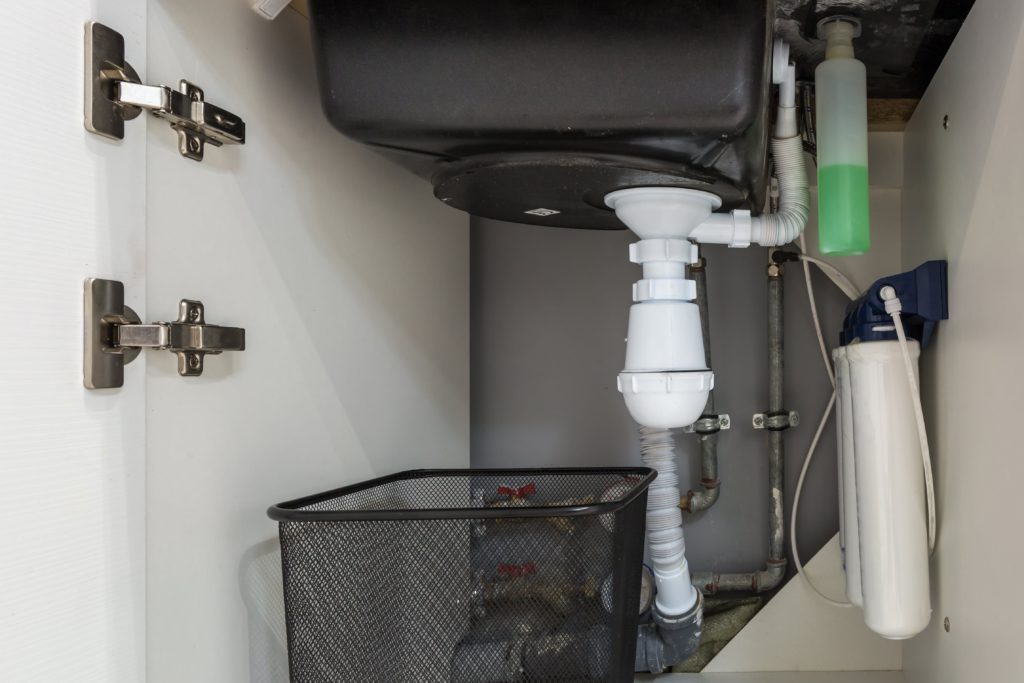
Under-sink water filters remove dangerous contaminants efficiently and they don’t occupy much space. Although a unit is usually big, it will be carefully concealed under the sink. This filtration system provides clean and pure water for drinking, cooking and washing purposes.
How Do Under-Sink Water Filters Work?
An under-sink filter is usually easy to install and there are several options regarding the cartridges and filters you can use. It works perfectly to purify city water and there are certain filters that can be installed to remove impurities from well water. You can also install an additional faucet for pure water.
String Filters
This will be the first stage that blocks sediments and large particles. This is a core with string coiled around it to catch particles of dust and rust. These filters last for long as they don’t usually get clogged easily and can be washed periodically.
Pleated Filters
Pleated filters are more effective than string filters so they can be used to purify well water. They trap impurities like dirt, sand, sediments and other smaller particles that can easily pass through the string filter. These polyester pleated filters shouldn’t be washed.
Activated Carbon Filters
These trap particles of chlorine, herbicides, insecticides, and microplastics. If you’re looking for a good filtration system, then you need to make sure that you’re getting a big block of activated carbon.
Pulsar Disrupter Filters
These use electroabsorption to get rid of organic impurities. They provide potent filtration up to 0.5 microns or less and the fibers have a zeta charge that blocks bacteria, viruses, cysts, in addition to heavy metals.
What are the Pros and Cons of Under-Sink Water Filters?
As you’re weighing different options, you should understand the benefits of installing an under-sink water filtration system.
- These are popular filtration systems because they’re easy to install and maintain.
- They represent a space-saving solution for smaller kitchens.
- There are several versatile options regarding the type of system and filters.
- Under-sink water filters are less expensive in the short and long run.
But these filtration systems aren’t for everyone. They come with a few disadvantages.
- Water is filtered at one location. If you have a big family, you might want to install a filtration system at every water outlet.
- Most systems require the installation of a new faucet which requires additional plumbing.
- Under-sink water filters aren’t that potent are removing bacteria, microorganisms, and other organic compounds.
Our Top Picks:
1. APEC WFS-1000 Super Capacity Premium Quality 3 Stage Under-Sink Water Filter System
Last update on 2026-02-16 at 06:56 / Affiliate links / Images from Amazon Product Advertising API
This is a 3-stage filtration system that comes with all the accessories needed for installation. It removes chemicals, odors, and tastes from your water source.
Unlike other models, this one can work with hard and well water thanks to its effective filters. Moreover, water pressure is good enough to satisfy the needs of a medium-sized household. It comes with a lead-free faucet.
The filters are designed to last for up to 12 months but might be changed earlier, especially if your water is heavily contaminated. It doesn’t remove all the minerals from your water, retaining its alkalinity and making it healthier.
If you have a high percentage of heavy metals and fluoride in your water, this system won’t work for you. The faucet comes in a stainless steel finish, so it might not be compatible with the rest of your fixtures.
Pros:
- A 3-stage filter to remove various types of impurities and sediments
- Keeps healthy minerals
- Easy installation and filters that last up to a year
- Can work with well and hard water
Cons:
- Doesn’t remove heavy metals and fluoride effectively
- The faucet might not match your kitchen fixtures
2. CuZn UC-200 Under Counter Water Filter
Last update on 2026-02-16 at 00:05 / Affiliate links / Images from Amazon Product Advertising API
This under-sink filter is easy to install and doesn’t need an additional faucet. It comes with a long-lasting filter that can purify water up to 50,000 gallons. It suits small and medium-sized households and can last for five years.
It features a combination of micro sediment membrane and a KDF-55 Coconut Shell Carbon so it can block lead, nickel, chromium, chlorine, in addition to dust and rust. The flow is 2 GPM but this unit doesn’t work with well water. It won’t resolve hard water issues.
You can easily install this unit to your cold water pipeline although it’s rather big. The filter is bacteriostatic and not subject to mold growth. However, after five years, you’ll have to replace the whole unit, saving you the cost and hassle of maintenance.
Pros:
- Easy to install and doesn’t require an additional faucet
- Filter is bacteriostatic and doesn’t allow the growth of mold
- Purifies up to 50,000 gallons of water
Cons:
- Doesn’t work with well water
- Filters can’t be changed
Best Faucet-Mounted Water Filters
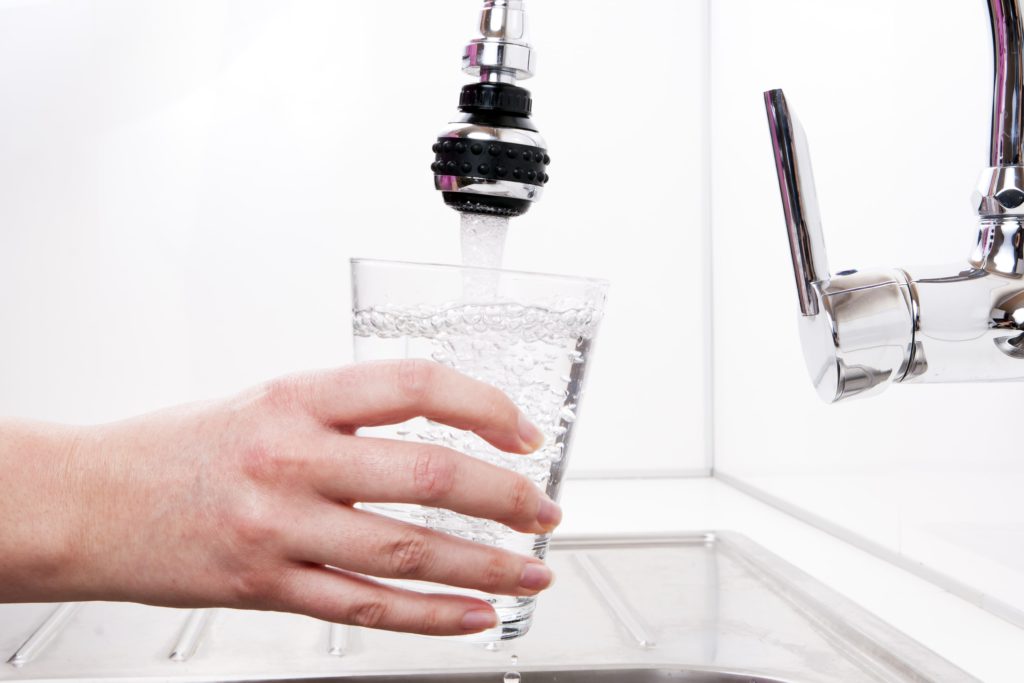
These are inexpensive water filters that work very well with previously treated municipal water to remove bad odors and tastes. However, faucet water filters don’t work with untreated well water or any water source that has been heavily contaminated.
How Do Faucet-Mounted Water Filters Work?
A faucet filter features a cartridge with several internal components to remove various types of contaminants. They can remove sediments, chlorine, VOCs, and heavy metals.
These filters are easy to install and will improve the taste and odor of water. They block usual microorganisms to protect your family. However, they don’t purify water like more advanced filtration systems.
What Are the Pros and Cons of Faucet-Mounted Water Filters?
These affordable filtration systems are highly popular because of several reasons.
- They don’t require any special plumbing. Most systems are quite easy to install and regular maintenance can be done by the homeowner. If you move places, you can easily reinstall the same unit.
- Faucet-mounted filters are very potent at removing chlorine. This immediately improves the taste and odor of your household water.
- They can block usual microorganisms that might be still present in city water. They also remove nitrates and nitrites that can be present in water due to the extensive use of herbicides and pesticides.
- These models provide the same quality you get in bottled water, but they’re more environmentally friendly.
- You can install one at each water outlet in your house.
Nevertheless, faucet-mounted filters come with several limitations.
- They don’t purify water. They only remove some of the impurities but not all of them.
- They won’t work if your water is heavily contaminated with heavy metals.
- Regular maintenance is needed to guarantee that the filter is doing its job.
- Some filters can decrease the water pressure.
Our Top Picks:
1. Engdenton Faucet Water Filter Stainless-Steel Reduce Chlorine High Water Flow
Last update on 2026-02-15 at 21:50 / Affiliate links / Images from Amazon Product Advertising API
This filter features a durable stainless steel housing that doesn’t crack and an activated carbon filter to remove impurities. It inhibits rust, dust, and debris and prevents the growth of mold and bacteria. This affordable filter provides 0.5 gallons per minute satisfying the needs of a medium-sized household.
It requires no additional plumbing, but it’s only compatible with a standard faucet. The filter is designed to last for six months after delivering 320 gallons of clean water.
If your water tastes funny or has a bad odor, you can buy this filter to improve its quality by removing chlorine. You can adjust it to any angle to get a water fountain at home. If you have hard water, this won’t work. However, it can handle well water if it’s not heavily contaminated.
Pros:
- Stainless steel housing with an activated carbon filter
- Removes chlorine
- High flow of water
- Angle can be adjusted 360 degrees
Cons:
- Doesn’t suit all faucets
- Doesn’t purify heavily contaminated water
2. RuiLing Faucet Water Filter
Last update on 2026-02-16 at 06:56 / Affiliate links / Images from Amazon Product Advertising API
This filter reduces impurities but keeps the healthy minerals in your water. It’s made of food-grade stainless steel that doesn’t leak or rust. You can easily switch between filtered and unfiltered water for all your household needs using a simple switch. Unlike other systems, this one can handle extremely cold as well as hot water up to 80 °C.
Installing this unit doesn’t take more than five minutes and doesn’t require any permanent changes, so it’s a great option for rentals and temporary living spaces. Moreover, there are two versions available so it’s compatible with most faucets on the market.
You won’t struggle with a decreased water flow when you install this unit. It will efficiently remove carcinogens, chloroform, bleach, algae, and rust. However, it won’t improve the quality of your water if it’s hard or contains lots of organic impurities. It can last up to three to six months, but regular cleaning is needed.
Pros:
- Food grade stainless steel filter
- Ability to switch between filtered and unfiltered water
- Good flow while blocking impurities
- Keeps healthy minerals to improve the taste
Cons:
- Doesn’t work if the water is heavily contaminated with organic compounds
- Regular cleaning to extend the life of the filter
Best Reverse Osmosis Water Filters
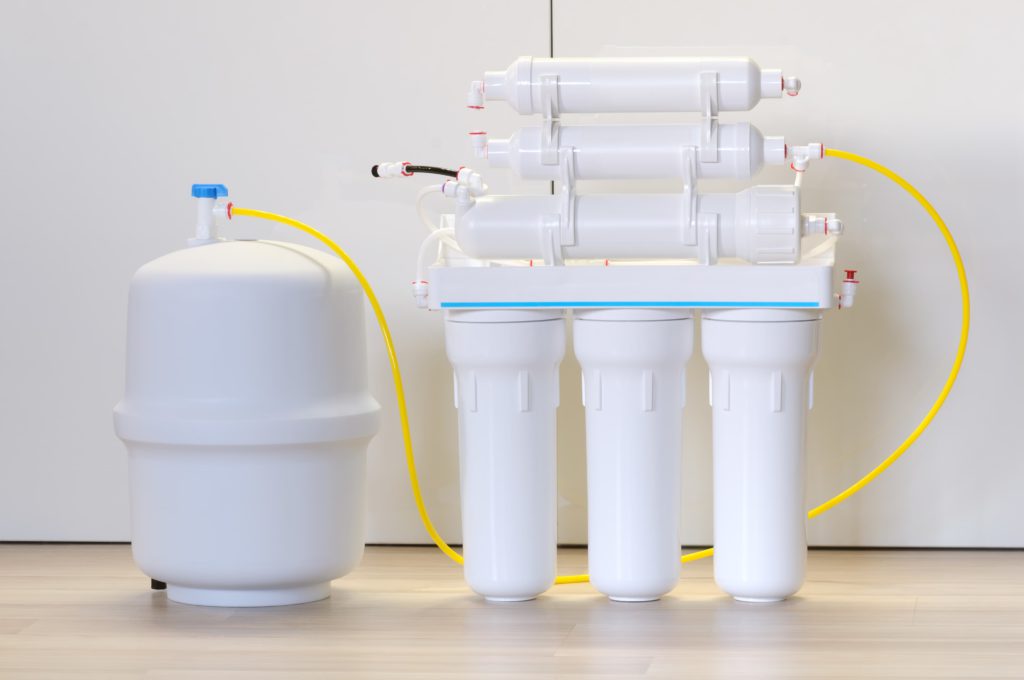
When all filtration systems fail, reverse osmosis systems can provide you with pure water. These systems are so efficient that they can remove from 95% up to 99% of all the contaminants in your water.
How Do Reverse Osmosis Water Filters Work?
These systems purify the water as it passes through several membranes and filters. They’re able to remove smaller particles, even dissolved ones improving the quality of heavily contaminated water. If you don’t have treated city water or if your water has a high content of salt, a reverse osmosis system can be used to make it suitable for your household use.
External pressure is applied to water, forcing it to pass through a semipermeable membrane. Only water molecules are allowed to pass, while all dissolved and suspended impurities will be blocked, directed towards the drain with wastewater. This wastewater might be returned to the main water supply, or directed towards another water outlet to water your plants or for laundry.
Unlike other systems, filters used in reverse osmosis systems will stay clean and won’t be replaced that often. These systems feature several filters to remove all types of organic and inorganic impurities including heavy metals, chlorine, and bacteria.
What are the Pros and Cons of Using Reverse Osmosis Water Filters?
Reverse osmosis technology is used by the food and pharmaceuticals industries to produce pure water. Here are some of the benefits of using a reverse osmosis filter in your household.
- These systems remove 99% of the contaminants that might still be present in your water after using any other filtration system. They can remove heavy metals, fluoride, pesticides, asbestos, and cysts. They can even be used to treat groundwater.
- The water produced smells and tastes better.
- Some models can be connected to your ice maker or fridge.
- Although these systems are potent at removing impurities, they’re quite easy to install. The filters may last for years.
But reverse osmosis water filters might not suit your household needs. Here are some of their cons.
- Most of these systems are expensive. However, you should think of your filtration system as an investment that will last for long.
- The water produced will taste dead or flat. This happens because reverse osmosis blocks all minerals and particles, even useful ones like calcium and magnesium. This is why it’s important to pick a system that features a mineralization stage, adding useful minerals to pure water.
- Each reverse osmosis system produces a significant amount of wastewater. This cost should be taken into consideration.
Our Top Picks:
1. Express Water Ultraviolet Reverse Osmosis Water Filtration System
No products found.
Using this reverse osmosis system, you’ll gain access to slightly alkaline pure water that is healthier and tastier. This filtration system gets rid of all impurities but adds calcium, magnesium, and potassium to your purified water to provide you with your daily needs of minerals.
This system is designed to remove up to 99.9% of lead, arsenic, fluoride, chlorine, and bacteria thanks to the 6 stages of filtration. Your water will be free of cloudiness, hardness, and turbidity. The UV sterilization removes bacteria, microorganisms, and viruses. The system is versatile so you can add or remove filters depending on your needs.
Due to the big number of filters, they’re all likely to last longer as water passes through different membranes. The pre-filters can be replaced every six months, while the reverse osmosis, post-carbon, and alkaline filters can be replaced once a year. The UV bulb provides 45,000 hours of UV protection. However, the housings aren’t clear so it’s difficult to monitor the condition of the filters.
It can be wall or cabinet mounted or kept freestanding. It can also be connected to your fridge. However, installing this system takes time as you’re likely going to get confused due to the number of filters.
All the filters are double sealed and the system features leak stop valves that shut off the water flow in case excess water is detected. The system can deliver 100 gallons of water per day with a rate of 0.8 GPM. It has an efficiency ratio of 2:1, which is higher than most reverse osmosis filtration systems.
Pros:
- Reverse osmosis system that works with hard water
- Adds minerals and increases the pH level of the water
- Double sealed filters that last for a long time
- High flow rate and efficiency ratio
Cons:
- Installing this unit is a bit confusing
- Filtration housings aren’t clear
2. AlcaPure Zero Installation Purifier Countertop Reverse Osmosis Water Filter
Last update on 2026-02-15 at 09:50 / Affiliate links / Images from Amazon Product Advertising API
This reverse osmosis system is portable and lightweight, so you can have pure water wherever you go. It purifies water from any contaminated source and produces 0.5 gallons of pH balanced water in 15 minutes. It comes with a 1-gallon tank that you have to fill, so it’s not the best option for a bigger household.
It simply works by filling the tank and waiting for the filter to do its job. However, you’ll have to empty the tank before you start a new round of filtration. As it removes debris and impurities, this filter will keep the healthy minerals for a better taste.
You don’t have to connect it to the main water supply and it uses a small amount of electric energy. Once the water is purified, the unit will turn itself off.
The unit features four filters that block larger particles, debris, VOCs, and other contaminants. It also removes salts so it’s a suitable choice for hard water.
The post-filter restores healthy minerals to your water and increases its pH level. It has a 50% recovery ratio but the wastewater is collected in a container so you can use it for other purposes.
Pros:
- Portable reverse osmosis system that requires no installation
- 3 filters to remove several types of impurities
- Restores healthy minerals to improve the taste of water
- Produces slightly alkaline water
Cons:
- Half of the water is collected as wastewater
- The tank is small
Best Water Bottles with Filters
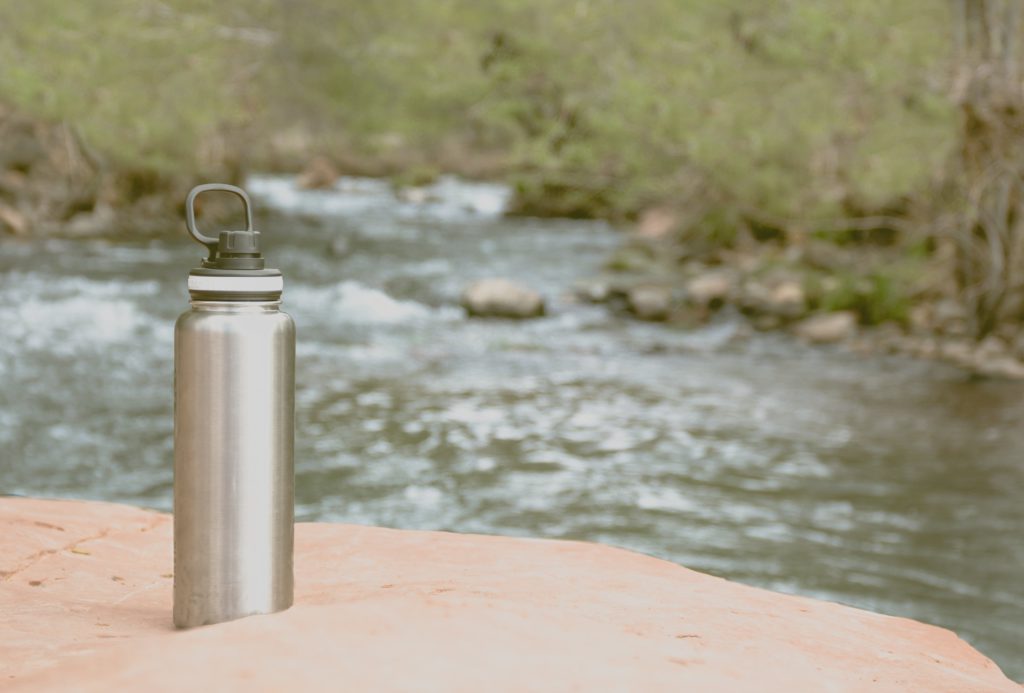
If you’re always on the go, you can buy a filtered water bottle to provide access to clean water when you’re away from home. Using these filters is more environmentally friendly and cost-efficient than using regular bottled water when you’re traveling, working out or chilling in your living room.
How Do Filtered Water Bottles Work?
The science behind these filters is pretty simple. The bottle is filled with water that passes through an activated carbon filter. This filter blocks chemicals and sediments that might contaminate your water. Some bottles have UV filters to kill viruses and bacteria. However, these aren’t very common and should be powered by batteries.
What are the Pros and Cons of Water Bottles with Filters?
Lots of users agree that filtered water bottles are very useful.
- They’re affordable and more cost-efficient than buying bottled water.
- Filtered water bottles are portable and easy to use.
- They guarantee your safety when you’re suspicious about the quality of water when you’re away from home.
- These bottles save you the hassle of purifying water using tablets or boiling when the quality of water is questionable.
These easy to use filters come with some drawbacks.
- In most cases, you should use a straw to drink. This might be inconvenient especially if you’re very thirsty.
- The amount of water is limited.
- Because you’re more likely to have a single filter, the quality of water is definitely less than the one you receive from a multi-stage or reverse osmosis filtration system.
Our Top Picks:
1. GRAYL Ultralight Water Purifier [+ Filter] Bottle
Last update on 2026-02-16 at 05:45 / Affiliate links / Images from Amazon Product Advertising API
This is a convenient and portable filtered water bottle that you can use while you’re away from home. Just fill the container and press it to have immediate access to clean water. It’s made of BPA-free materials and silicone so it’s lightweight and doesn’t break.
It’s designed to get rid of more than 99% of sediments, disease-causing bacteria, viruses, heavy metals, and chlorine to improve the taste and color of the water. It can be used with heavily contaminated freshwater. The filter purifies 500 ml of water in 15 seconds and you can drink directly from the bottle. It doesn’t work with brackish or ocean water.
The bottle comes in four different colors. Some force is needed to filter the water and the filter should be changed after 300 uses or purifying 40 gallons of water. However, there’s no notification or alarm, so you’ve got to keep a manual track of your usage.
Pros:
- Portable and lightweight silicone water bottle filter
- Removes 99% of the contaminants in water, including bacteria, viruses, and heavy metals
- You can drink directly from the bottle
Cons:
- No indication that the filter should be changed
- Physical pressure is needed to push the water through the filter
2. Brita 36387 Premium Water Filter Bottles
Last update on 2026-02-16 at 06:56 / Affiliate links / Images from Amazon Product Advertising API
This bottle is made of BPA-free plastic and can purify up to 40 gallons of water. This is equivalent to two or three months of regular use so it’s a great option for someone who lives alone. It comes in seven different colors.
It features a leak-proof lid and a cup holder friendly design so you can take it wherever you like. The lid is easy to open and the bottle is dishwasher safe.
Regular cleaning of the filter will prolong its life; however, it won’t remove bacteria and viruses. Nevertheless, it will improve the taste and purify your water from chlorine. You should use the straw to drink from the bottle.
Pros:
- Lightweight BPA-free bottle
- Cleanable filter to guarantee the quality of water
- Quickly removes chlorine and improves the taste
Cons:
- Doesn’t remove bacteria or viruses
- You drink using a straw
Conclusion
Many contaminants can’t be seen, tasted or smelled. This means that using a water filtration system is imperative. Luckily, you can find a good option that suits every budget and household need.
Finding the best water filter can be a little tricky. You must choose the right filter depending on the condition of your household water and the list of impurities you’re concerned about.
If you’re looking for a practical filtration system, we recommend the iSpring WGB32BM 3-Stage Whole-House Water Filtration System. This system works for most household needs and removes 99% of the impurities that can harm your family.

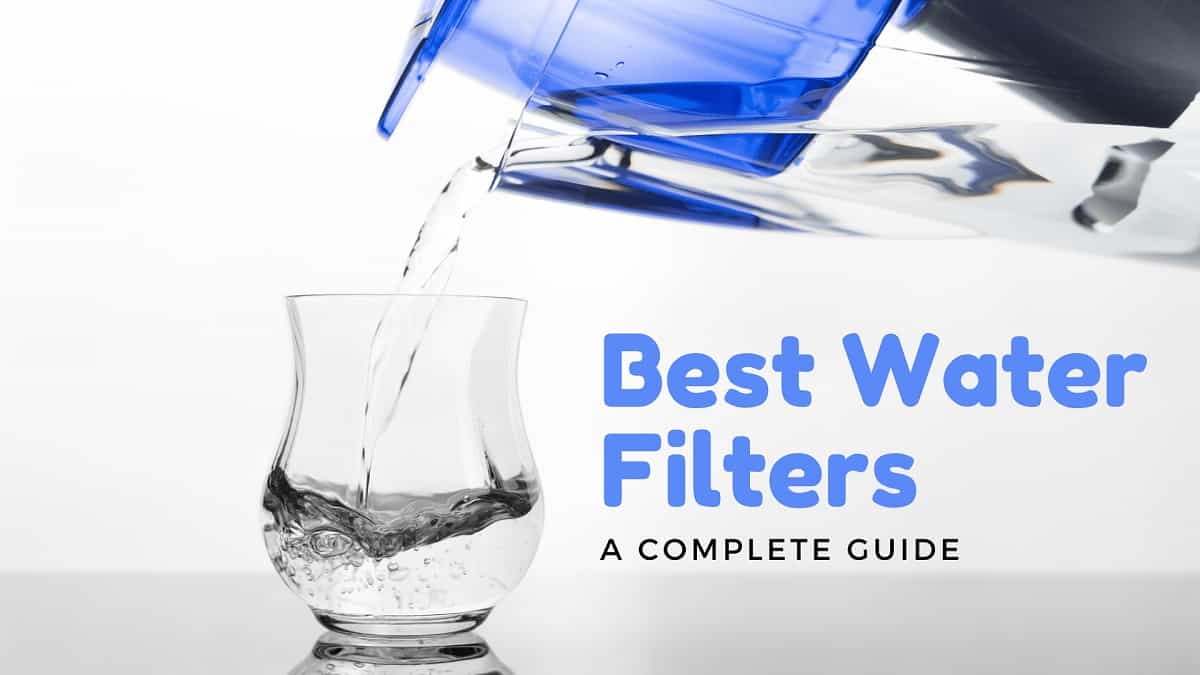

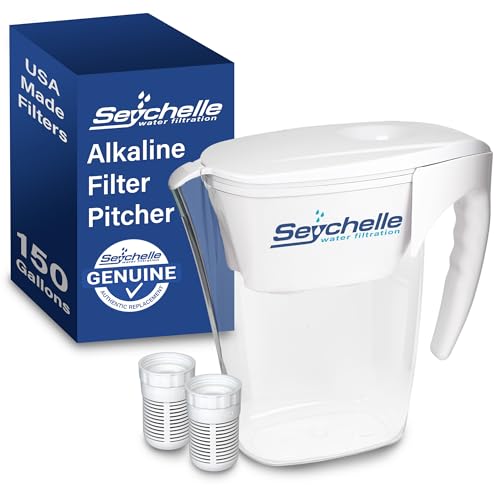



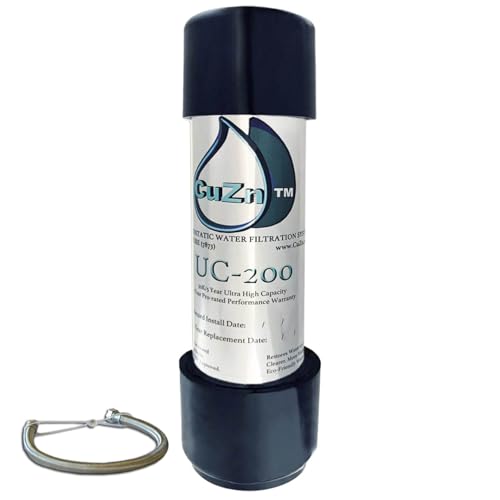


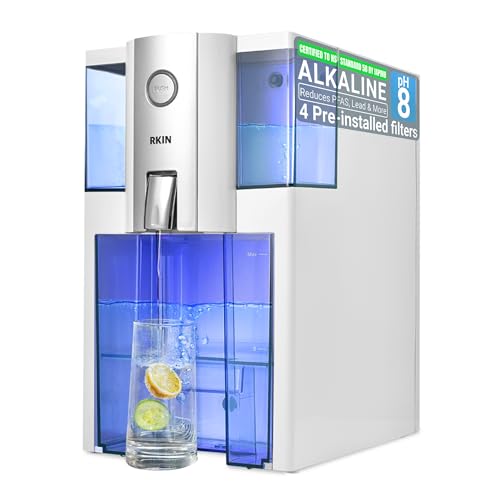
![GRAYL Ultralight Water Purifier [+ Filter] Bottle (Blue)](https://m.media-amazon.com/images/I/31XzokYXWmL.jpg)
